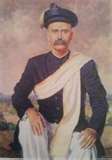Gopal Ganesh Agarkar
This article needs additional citations for verification. (June 2017) |
Gopal Ganesh Agarkar | |
|---|---|
 | |
| Born | 14 July 1856 |
| Died | 17 June 1895 (aged 38) |
| Nationality | |
| Education | Deccan College (B.A.), (M.A.) |
| Occupation(s) | Educationalist, writer, editor, social reformer |
| Known for | Founder of the Deccan Education Society |
| Spouse | Yashodabai Agarkar |
Gopal Ganesh Agarkar (14 July 1856 – 17 June 1895) (ⓘ) was a social reformer, educationist, and thinker from Bombay Presidency, British India.
At one time a close associate of Bal Gangadhar Tilak, he co-founded educational institutes such as the New English School, the Deccan Education Society and Fergusson College along with Tilak, Vishnushastri Chiplunkar, Mahadev Ballal Namjoshi, Vaman Shivram Apte, V. B. Kelkar, M. S. Gole and N. K. Dharap.[citation needed] He was the first editor of the weekly Kesari newspaper and founder and editor of a periodical, Sudharak. He was the second principal of Fergusson College, serving in that post from August 1895 until his death.
A locality in Andheri, Mumbai outside the railway station (east side) is named after him as Agarkar Chowk, and another locality in Pune containing the Pune railway station and General post office of Pune (with the Zero Milestone of Pune) is named after him as Agarkar Nagar.
Early life
[edit]Gopal Ganesh Agarkar was born on 14 July 1856 in Tembhu, a village in Karad taluk, Satara district, Maharashtra.[1][2]
Agarkar was schooled in Karad and later worked as a clerk in a court there. In 1878, he received his B. A. degree, and in 1880 was awarded an M.A.[citation needed] In his early years, Agarkar developed a close relationship with Tilak. As college students, he and Tilak decided never to join government service and pledged to dedicate their lives to the education and independence of their country. Agarkar believed that education was a powerful weapon in the fight for independence, as it would give the Indians the confidence to question the British and thus strengthen the fight for freedom. Agarkar established the New English School in Pune along with Tilak and Vishnu Chiplunkar.
In 1884, Agarkar and Tilak established the Deccan Education Society in Pune. The Society's members had to devote themselves entirely to the cause of education and teaching, despite low pays. Agarkar was also associated with the nationalist newspaper Kesari, first published in 1880. He used to write and edit, and his articles strongly endorsed the cause of national freedom and espoused national resistance to the British atrocities. During his lifetime, Agarkar was an active campaigner for social reforms, and believed in giving citizens their political rights. According to him India would not be able to rise and be free if casteism and religious superstitions were not eradicated. He felt that social reforms were necessary for political reforms. He started his own newspaper Sudharak (The Reformer), which challenged both untouchability and casteism. In 1895, Agarkar passed away. He was a profound thinker who will always be remembered for his selfless service to the country.
Social activism and later life
[edit]He was the first editor of Kesari, a prominent Marathi-language weekly newspaper founded by Lokmanya Tilak in 1880–1881. Ideological differences with Tilak caused him later to leave. They disagreed on the primacy of political reform versus social reform, with Agarkar believing that the need for social reform was more immediate. He started his own periodical, Sudharak, in which he campaigned against the injustices of untouchability and the caste system. Agarkar abhorred blind adherence to and glorification of tradition and the past. He supported widow remarriage.[3] From 1892 to 1895 he was the principal of Ferguson College.
Agarkar suffered from severe asthma throughout his life and succumbed to it on 17 June 1895.
Publications
[edit]- Futke Nashib (Biography)
- Alankar Mimmansa (अलंकार मीमांसा)
- Dongarichy Turangatil 101 divas (1882)
- Marathi translation of Shakespeare's play "Hamlet" - "VikaraVilasit" ("विकारविलसित")
References
[edit]- ^ Mohammad Shabbir Khan (1992). Tilak and Gokhale: A Comparative Study of Their Socio-politico-economic Programmes of Reconstruction. APH Publishing. p. 10. ISBN 9788170244783.
In another important aspect the second year was also significant as in the rank of faculty members, Gopal Ganesh Agarkar (1856-1859) joined. Agarkar was a brilliant Chitpavan Brahmin, M.A. at the Deccan College when Tilak met him first.
- ^ Richard I. Cashman (25 September 2018). The Myth of the Lokamanya: Tilak and Mass Politics in Maharashtra. University of California Press. p. 222. ISBN 978-0520303805.
- ^ Tarique, Mohammad. Modern Indian History. Tata McGraw-Hill. p. 8.10. ISBN 978-0-07-066030-4. Retrieved 24 October 2010.
Further reading
[edit]- S. M. Garge [स मा गर्गे] (1996). Gopal Ganesh Agarkar [गोपाळ गणेश आगरकर]. National Book Trust, India. ISBN 81-237-1745-8.
- Aravind Ganachari [अरविंद गणाचारी]. Gopal Ganesh Agarkar - The Secular Rationalist Reformer. Popular Prakashan, India. 2005. ISBN 81-7991-226-4 (3974). [1]
